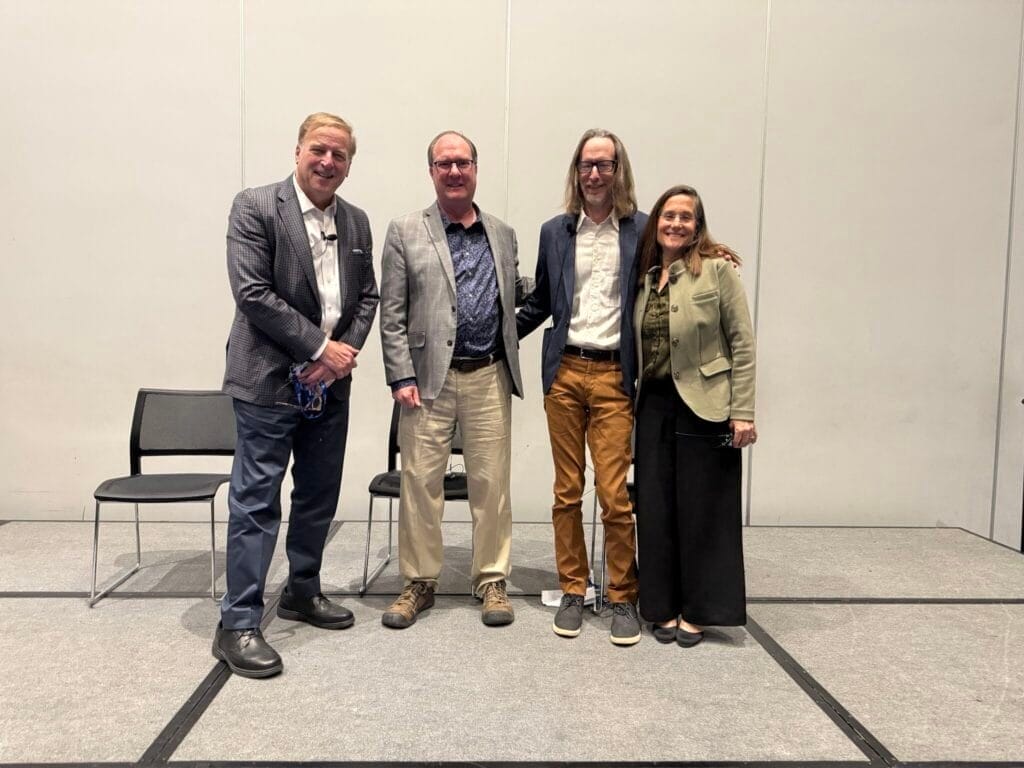
Recap: Lincoln Institute at American Planning Association’s 2025 National Planning Conference
In another edition of a mayors panel at the American Planning Association’s National Planning Conference, three Colorado mayors weighed in on the trials and tribulations of local leadership at a time of retrenchment at the federal level.
“If we’re going to get it done, it has to be done at the local level or the state level,” said Fort Collins Mayor Jeni Arndt, responding to a question about climate action. “In addition to reducing our carbon footprint, which has been a focus for a long time, something that we’re increasingly focused on is how to be resilient in the face of the climate change that is already happening and that we know is only going to get worse in the future. . . . We’re not going to stop.”
Arndt was joined by Boulder Mayor Aaron Brockett and Denver Mayor Mike Johnston, who appeared by prerecorded video, in a special session at the Colorado Convention Center co-moderated by Anthony Flint, author of Mayor’s Desk: 20 Conversations with Local Leaders Solving Global Problems, and Rob Walker, author of City Tech: 20 Apps, Ideas, and Innovators Changing the Urban Landscape.

The mayors panel, a reprise of a similar Q&A with the mayors of Minneapolis, Cincinnati, and Scranton, Pennsylvania, at the 2024 National Planning Conference, was oriented around the use of technology in cities, from apps designed to facilitate civic engagement to geospatial mapping that can help identify buildable land for new housing.
“The data that we have available … is incredibly important when you’re evaluating what are the next opportunities,” said Brockett, noting efforts in Boulder to encourage infill redevelopment, which would add housing supply in a city well known for a lack of affordability.
Other highlights from the National Planning Conference 2025 included:
- The 2025 Trend Report: Emerging Trends and Signals. This annual report, a partnership between APA and the Lincoln Institute, highlights trends for planners tasked with helping their communities navigate change and uncertainty. While conventional planning practices often reflect past data and current assumptions, the Trend Report is an account for emerging trends on the horizon. The presentation, with Petra Hurtado, Ievgeniia Dulko, Senna Catenacci, and Joseph DeAngelis from APA, outlined emerging trends and introduced strategies for making sense of the future. The speakers emphasized that by embracing foresight—understanding potential future trends and knowing how to prepare for them—planners can effectively guide change, foster more sustainable and equitable outcomes, and position themselves as critical contributors to thriving communities.
- Innovative Governance: Scenario Planning for Strategic Coordination. The Lincoln Institute’s Heather Sauceda Hannon, AICP, shared a case study of a one-day scenario planning workshop that brought together a range of government stakeholders to better prepare for future wildfires in Chile. Hannon detailed how the group applied the process of scenario planning—which is transferable to different types of issues—to identify uncertainties in the region, develop four possible futures, and agree on prioritized strategic actions. Because the group was tackling the problem from different perspectives, bringing them together fostered cohesion, an alignment of values, and a clearer path forward.
- Planning With Strategic Foresight. Heather Hannon also participated in a session that explored the practice of “futures literacy,” defined as the skills that facilitate better understanding of the role the future plays in a fast-changing world. She and Petra Hurtado, Ievgeniia Dulko, and Senna Catenacci from APA recognized that tech innovations, societal and political shifts, climate change, economic restructuring, and unknown ramifications from COVID-19 make it difficult to plan effectively, and suggested the path forward requires adjusting, adapting, and reinventing planning processes, tools, and skills. The approach entails the ability to imagine multiple plausible futures, and an understanding of how to prepare for future uncertainties, including the need to be nimble.
- APA Water and Planning Network Meeting. Led by Mary Ann Dickinson, policy director of Land and Water for the Lincoln Institute, this gathering drew land use planners and water systems planners who work toward better integration of water and land use planning. The activities of the APA’s 550-member Water and Planning Network, which include newsletters and webinars on relevant topics, were detailed for the year ahead.
- Housing Finance for Equitable Planning: Lessons from Cities. In this session in the virtual segment of the conference, Heather Hannon and Arica Young from the Lincoln Institute joined Samuel P. Leichtling from Milwaukee’s Department of City Development and Rico Quirindongo from Seattle’s Office of Planning and Community Development to help attendees better understand the residential housing market. Sharing trends and best practices from across the country, the presenters offered land use solutions and policies that balance the need for affordable housing while ensuring their cities are accessible to all.
Catherine Benedict is the digital communications manager at the Lincoln Institute of Land Policy.
Lead image: Downtown Boulder, Colorado, which is incorporating data analysis into its housing strategies. Credit: espiegle via Getty Images Plus.
